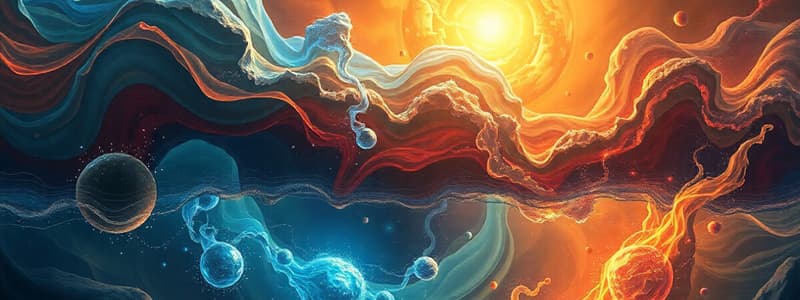Podcast
Questions and Answers
Which process is an example of a physical change?
Which process is an example of a physical change?
- Burning wood
- Rusting iron
- Decomposing food
- Melting ice (correct)
What does the law of conservation of mass state?
What does the law of conservation of mass state?
- Mass can be destroyed during a reaction
- Mass of reactants equals mass of products (correct)
- Mass can be created during a reaction
- Mass is only found in solid states
Which observation indicates a chemical change has occurred?
Which observation indicates a chemical change has occurred?
- Change in smell of a substance (correct)
- Identification of the same substance
- Change in color only
- Change in temperature only
What is the primary characteristic of a chemical change?
What is the primary characteristic of a chemical change?
According to the kinetic theory of matter, which statement is true?
According to the kinetic theory of matter, which statement is true?
Which term describes the transition of matter from one state to another?
Which term describes the transition of matter from one state to another?
What happens to the average kinetic energy of particles when the temperature increases?
What happens to the average kinetic energy of particles when the temperature increases?
Which of the following is a characteristic of a physical change?
Which of the following is a characteristic of a physical change?
Study Notes
Physical Changes
- A physical change alters a substance without changing its composition.
- A phase change is a transition of matter from one state to another due to changes in temperature and pressure.
- Phase changes include boiling, freezing, melting, vaporizing, and condensing.
Chemical Changes
- A chemical change involves one or more substances changing into new substances.
- Chemical changes are commonly referred to as chemical reactions.
- Decomposing, rusting, exploding, burning, and oxidizing are all examples of chemical changes.
- A chemical change always produces a change in properties, such as smell, color, or magnetism.
Conservation of Mass
- The law of conservation of mass states that mass is neither created nor destroyed in a chemical reaction.
- The mass of the reactants equals the mass of the products.
The Kinetic Theory of Matter
- The kinetic theory of matter explains the behavior of matter based on the motion of its particles.
- Matter is composed of tiny particles that are too small to be seen with the naked eye.
- These particles are in constant motion, moving in all directions, even in solids.
- The particles collide with each other and the walls of their container, causing the pressure exerted by the gas.
- The average kinetic energy of the particles is proportional to the temperature of the matter, meaning faster-moving particles indicate a higher temperature.
Studying That Suits You
Use AI to generate personalized quizzes and flashcards to suit your learning preferences.
Related Documents
Description
Explore the distinctions between physical and chemical changes with this quiz. Learn about phase changes, conservation of mass, and the kinetic theory of matter. Test your knowledge on how substances interact and transform.




